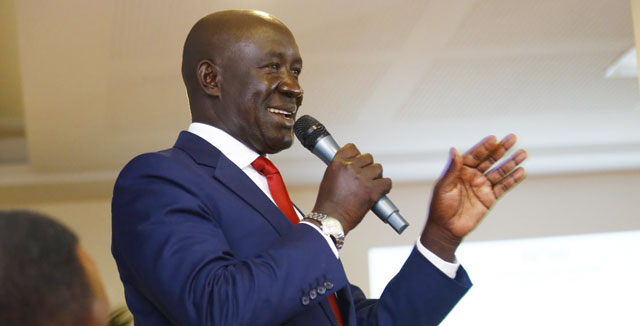
Kampala, Uganda | THE INDEPENDENT & AFP | Uganda is ready to take in up to 500 African migrants from Israel, State minister of disaster preparedness and refugees Musa Ecweru has revealed.
“The State of Israel working with other refugees’ managing organisations has requested Uganda to allow about 500 Eritreans and Sudanese refugees to relocate to Uganda. The Government and Ministry are positively considering the request,” Ecweru said at a press briefing on Friday.
“We already have millions of refugees in Uganda from Somalia, Ethiopia so the few from Israel won’t be a problem to Uganda as a third party country.”
Uganda has for the past year refuted reports linking them to the settlement of the immigrants. “We are slow but very sure on the issue of refugees that we host. To my knowledge, no refugees from Israel have come in yet. The ones coming are going to the settlement,” Ecweru said.
Israel in January announced the implementation of a programme to remove migrants who entered illegally, giving them a choice between leaving voluntarily or facing indefinite imprisonment with eventual forced expulsion.
According to interior ministry figures, there are currently some 42,000 African migrants in Israel, half of them children, women or men with families, who were not facing immediate deportation.
As the migrants could face danger or imprisonment if returned to their homelands, Israel offered to relocate them to an unnamed African country, which deportees and aid workers said was Rwanda or Uganda.
Rwanda and Uganda earlier said they would not accept those deported against their will.
Months of denial end
Uganda’s motivation is “purely humanitarian” and “all refugees world over, are voluntarily repatriated” in “strict observance” of international law, Ecweru said.
In November last year, Israeli Prime Minister Benjamin Netanyahu announced plans to deport some 40,000 African migrants who had entered the country illegally.
Africans began entering Israel through what was then a porous Egyptian border in 2007. The border has since been strengthened, all but ending illegal crossings.
Netanyahu’s plan has stirred up a political storm, given that some migrants come from Eritrea or Sudan, where rights experts point to a high risk of abuse or armed conflict.
Israel tacitly recognises the Sudanese and Eritreans cannot be returned to their dangerous homelands, which is why a third country was sought as a viable option.
Netanyahu has repeatedly referred to migrants from these countries as “not refugees but illegal infiltrators”. The United Nations has referred to the migrants as “people needing asylum”.
Deportees and aid workers said the destination sketched in Netanyahu’s plan was either Rwanda or Uganda, although both countries denied that any such deal had been agreed.
Rights groups reported that Israel had offered the migrants $3,500 (2,800 euros) to relocate to Uganda or face indefinite imprisonment with eventual forced expulsion.
Netanyahu last week agreed to cancel the controversial plan and grant 16,000 migrants temporary residency with an equivalent number resettled in Western nations. But he reversed his position just hours later.
– Appeal –
The UN refugee agency (UNHCR) on Friday said it did not know what had been agreed between Israel and Uganda and was seeking more information.
But it reiterated its appeal for the deal scuppered by Netanyahu — the Framework of Common Understanding — to be implemented, calling it a “win-win for everyone”.
“We have been appealing for Israel to halt its policy of relocating asylum-seekers to sub-Saharan Africa,” UNHCR spokesperson Duniya Khan told AFP by phone from Nairobi.
Human rights groups have long condemned Israel for its immigration policy and treatment of Africans seeking a safe haven.
In reply, Israeli officials say that no-one they classify as a refugee or asylum seeker will be deported.
However, the process of granting asylum in Israel has been criticised as extremely slow and biased against claims. Only a handful of asylum claims have been approved in recent years.
Under a previous plan launched in 2013, more than 4,000 African migrants left Israel for Uganda and neighbouring Rwanda, according to campaign groups.
Andie Lambe, executive director of International Refugee Rights Initiative, based in the Ugandan capital Kampala, told AFP that migrants arriving under that scheme were denied official refugee status — something she wants to see change if the request announced on Friday goes ahead.
Lambe argued that the question remained, “Why can’t Israel simply accommodate these people?”
 The Independent Uganda: You get the Truth we Pay the Price
The Independent Uganda: You get the Truth we Pay the Price





